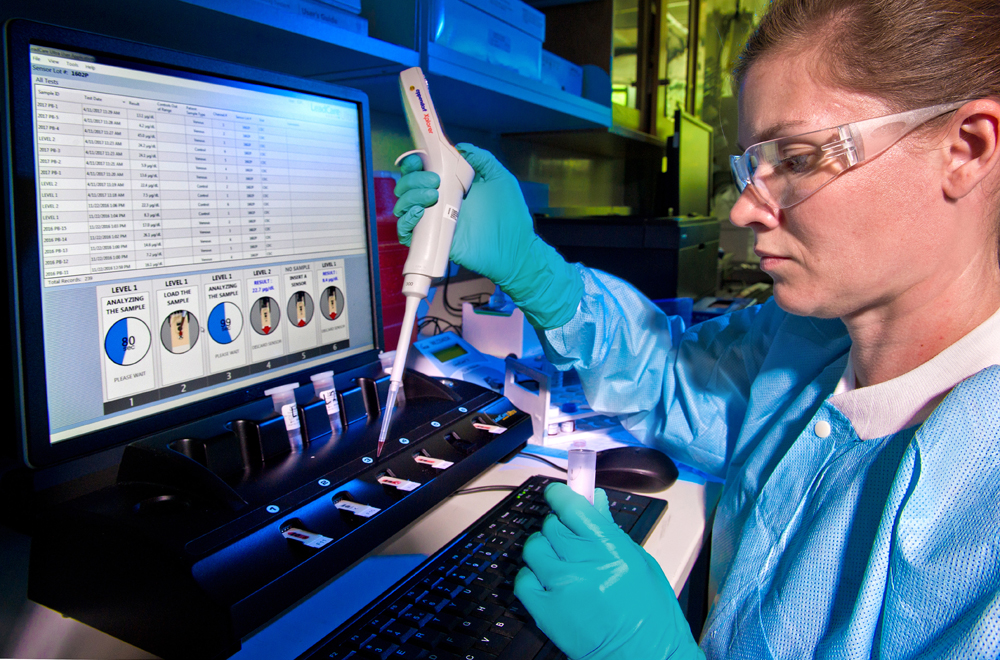At a glance
CDC advances two coequal and interrelated priorities: to strengthen safety and scientific excellence of every CDC laboratory. The director for the Office of Laboratory Systems and Response is the senior official who serves as the single point of accountability for laboratory science and safety at CDC.

Director for the Office of Laboratory Systems and Response

Learn more about Dr. Salerno on CDC’s leadership page.
CDC Activities to Strengthen Safety and Scientific Excellence in CDC Laboratories
Overseeing Safety in CDC Laboratories
CDC is committed to continually improving its culture of safety in its laboratories where transparency and accountability are valued; staff receive complete, comprehensive, and cutting-edge safety training; the safety of a procedure or project is considered before all else; and potential safety issues are quickly and openly addressed.

While working with dangerous pathogens, chemicals, and toxins always carries a degree of risk, CDC is committed to identifying, mitigating, reducing, and eliminating these risks in every feasible way to protect the safety of its staff and the American public.
The Office of Laboratory Systems and Response (OLSR) oversees biological, chemical, and radiation safety at CDC laboratories. The OLSR safety inspectors visit CDC laboratories annually to ensure that their practices, procedures, and equipment meet key safety standards. The oversight includes ensuring that CDC laboratories are in full compliance with the requirements of the Federal Select Agent Program, which regulates the possession, use, and transfer of biological select agents and toxins.
The OLSR also manages CDC’s Animal Care and Use Program Office (ACUPO), assuring CDC compliance with guidance and regulations for the responsible care of research animals at CDC.
Providing the Standards and Guidance on Biosafety
CDC co-authors the foundational biosafety manual Biosafety in Microbiological and Biomedical Laboratories (BMBL), in partnership with the National Institutes of Health (NIH). Now in its 6th Edition, the BMBL has become the standard guidance for biosafety practices in laboratories across the country.
Providing Biosafety Oversight
The mission of the CDC Institutional Biosafety Committee (IBC) is to review, approve, and provide safety oversight to projects involving recombinant DNA research in accordance with the responsibilities defined in Section IV B-2 of the National Institutes of Health (NIH) Office of Science Policy, Guidelines for Research Involving Recombinant Deoxyribonucleic Acid (rDNA) Molecules (NIH Guidelines).
Learn more about the IBC membership roster and meeting minutes
Supporting Animal Care and Use in CDC Laboratory Research
CDC has a legal and moral responsibility to ensure that the animals entrusted to our care are treated in accordance with the highest standards of animal welfare and care. Research studies involving animals conducted at or supported by CDC must comply with the Animal Welfare Act (AWA) regulations promulgated by the United States Department of Agriculture (USDA) under Title 9, Code of Federal Regulations, Parts 1-3 as well as the Public Health Service Policy on Humane Care and Use of Laboratory Animals (PHS Policy) administered by the National Institutes of Health (NIH), Office of Laboratory Animal Welfare (OLAW). As an OLAW Assured institution, all CDC animal studies adhere to the Guide for the Care and Use of Laboratory Animals. In addition, all animal studies must be approved by and conducted in accordance with the policies set forth by the Institutional Animal Care and Use Committee (IACUC), an oversight body mandated by the AWA to review all research studies involving animals at CDC to ensure compliance with animal welfare standards. CDC is also voluntarily accredited with the Association for Assessment and Accreditation of Laboratory Animal Care International (AAALAC), demonstrating CDC’s highest commitment to animal welfare and going above and beyond what is required by federal law.
Learn more about some of the regulatory and ethical standards governing research with animals at CDC
Advancing the “Science of Laboratory Safety”
CDC is committed to advancing the “science of laboratory safety”—applying the same rigorous scientific methods to the safety of CDC’s laboratories that CDC uses to confront threats to the public’s health. To spur the science of safety in CDC laboratories, OLSR supports CDC laboratories to advance innovative research or solutions to laboratory safety challenges.
Advancing Laboratory Scientific Excellence
One of the tenets of CDC's Pledge to the American People is that CDC will "base all public health decisions on the highest quality scientific data that is derived openly and objectively." OLSR is committed to ensuring that CDC laboratories continue to fulfill this pledge and serve as a model for scientific excellence and quality.
The scientific data produced by CDC's laboratories provides a crucial foundation for sound, evidence-based public health decision-making across the country. OLSR aids this work by providing CDC laboratories with leadership and technical expertise that both supports, and helps to advance excellence in laboratory science throughout CDC.
OLSR supports this work by providing oversight and coordination of laboratory quality management and training programs for CDC laboratories. OLSR establishes teams responsible for developing agency-level plans, policies, guidelines, manuals, and tools for implementation of quality management programs within Centers, Institutes and Offices, and for the continual improvement of laboratory quality and safety training for CDC staff.
Fostering the Next Generation of Laboratory Leaders
CDC's Laboratory Leadership Service (LLS) is a fellowship program that prepares early career laboratory scientists to become future laboratory leaders. The fellowship combines competency-based public health laboratory training with practical, applied investigations and service. LLS will provide CDC and public health laboratories across the country with a pool of expertly trained laboratory scientists poised to meet the evolving challenges of laboratory science and safety.
Learn more about CDC's Laboratory Leadership Service
Providing State-of-the-Art Laboratory Trainings
Maximizing the safety and impact of CDC's laboratories requires a workforce of laboratory scientists trained in state-of-the-art techniques and technology. In partnership with the Division of Laboratory Systems and Safe Labs Program, OLSR supports the development of a comprehensive training curriculum to ensure that CDC's laboratory scientists are equipped to meet current and future public health challenges.
In 2019, CDC opened a state-of-the-art laboratory training facility where these trainings could be held. The 4,760 square-foot facility was designed to provide hands-on training to laboratory scientists with access to high containment laboratories. This space offers CDC laboratory programs a facility to test new protocols and equipment in a realistic laboratory setting in the absence of pathogens.
